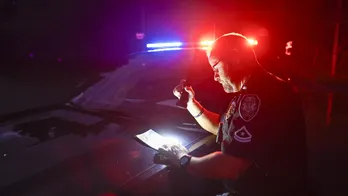A corruption trial revealed a #MeToo ethics entanglement for a top Biden adviser
A top adviser to President Joe Biden, whose prominent communications firm helped launch a high-profile effort to assist victims of sexual harassment, rape and assault, was also a paid adviser to a powerful Illinois politician while he was being sued by one of those victims.
Anita Dunn, co-founder of the communications firm SKDK and widely considered a member of the president's inner circle, provided "crisis communications" assistance to Michael Madigan, the then-Speaker of the Illinois House of Representatives, from 2018 to 2019. That work netted Dunn and her firm more than $200,000, according to campaign finance disclosures.
Madigan, who was also the leader of the state Democratic Party at the time, was not personally accused of sexual misconduct, but was being sued by a former employee of his political committees. That former employee, Alaina Hampton, alleged that Madigan retaliated against her when she reported that her direct supervisor had repeatedly harassed her over text messages.
While Dunn was advising Madigan, Hampton received support in her case from Dunn's firm, which partnered with the anti-harassment charity Time's Up. Dunn's work for Madigan was specifically focused on responding to allegations stemming from Hampton's lawsuit.
As a result, SKDK (the D stands for "Dunn") was on the one hand supporting Hampton in her harassment and retaliation case through its partnership with Time's Up, and on the other getting paid by a defendant in that very lawsuit.
Hampton said Dunn and SKDK's representation of Madigan was not disclosed to her at the time.
"They never told me that they were also working for Michael Madigan and had they disclosed that with me, I would have never applied for legal funding or PR support with them," Hampton told NPR in an interview.
Reached by phone, Dunn said she was heading into a meeting and told NPR to "just call SKDK on that, thank you," before hanging up.
An SKDK spokesperson, Michael Czin, initially offered a defense of the firm's work for Madigan, saying that "we have a stringent internal conflict process. The work for the former Speaker cleared that conflict process and was designed to help him fix his workplace rather than paper over his very real problems."
The following day, however, SKDK revised its statement, saying, "In retrospect, we realize that the decision to work with then-Speaker Madigan's campaign on these matters was an error in light of the support Ms. Hampton was receiving from another firm through a separate initiative we were proud to support."
"We apologize to Ms. Hampton and her allies and reiterate our full support for the survivor community," the statement concluded.
Adding to Hampton's frustration at SKDK was the manner in which she learned about SKDK and Dunn's apparent conflict of interest.
The revelation came out during a trial last month — part of a long-running federal corruption investigation into Madigan — in which two of Madigan's top aides were caught on an FBI wiretap briefly discussing Dunn's "crisis communications" work for them.
One of the two men recorded on the wiretap, both of whom are now convicted felons, even spelled out her name, "D-U-N-N." An email discussing Dunn and SKDK's work for Madigan was also entered into evidence. Prosecutors never implicated Dunn or SKDK in any of the alleged wrongdoing by Madigan or his allies. Chicago Public Media and the Chicago Sun-Times covered the trial extensively, and shared the evidence with NPR.
"To learn that [Dunn] was helping advise my former employer on my retaliation case due to sexual harassment is just a clear conflict of interest, and I think anyone can see that for what it is," said Hampton. "It's really a violation of trust and it feels like a betrayal."
Uma M. Iyer, a spokesperson for the Time's Up Legal Defense Fund, said in a statement: "We were surprised to learn from press coverage that Speaker Madigan retained SKDK – we had no prior knowledge of this fact and can imagine how a revelation like this is deeply upsetting to Ms. Hampton. As a team made up of survivors and individuals who fight for justice every day, we share her frustration."
The revelations from the trial have led Hampton to go digging through her old emails and her memory, trying to determine what information she shared with her contacts at SKDK. Five years ago, when she was 28 years old and going through the harassment and retaliation case against one of the most powerful men in Illinois politics, she said she viewed Time's Up and SKDK as her allies.
"It kind of was like a weight off of my shoulders, especially at a time where I was so vulnerable," Hampton said she felt at the time. "I had a lot of the political players in Illinois completely against me."
Now, she feels deceived by the very people who thought were her unconditional supporters.
"Through my case, a lot of women have reached out to me for help, and I used to refer them to Time's Up," she said. "And I feel sick about it."
In response to NPR's questions, a spokesperson for SKDK maintained that information Hampton shared about her case with her contacts at SKDK was never provided to the SKDK employees working for Madigan.
NPR asked for a copy of SKDK's conflict of interest policy, but the firm declined to provide it.
Both SKDK's initial and revised statement emphasized that Hampton's primary contact at SKDK was not a full-time employee but an outside contractor. SKDK contended that the contractor "worked with dozens of firms around the country to pair PR professionals with countless numbers of survivors. This work was largely administrative and was not performed by an SKDK employee. The contractor did not work for or advise any of SKDK's other clients."
SKDK added in its revised statement that "Ms. Hampton was not an SKDK client."
Hampton rejects SKDK's suggestion that the firm only had minimal contact with her through an independent contractor. She notes that emails about her case cc'd a managing director of SKDK, Kendra Barkoff Lamy. According to an archived version of her bio on SKDK's website, Barkoff Lamy led SKDK's work with the Time's Up Legal Defense Fund during the time of Hampton's case.
Over her decades-long career, Dunn has been called a trailblazer for women in the world of politics. She served as communications director in Barack Obama's White House, helped lead the Biden campaign to victory in 2020 and has touted the fact that the Biden administration has placed many women in senior roles. In an interview with C-SPAN early on in the Biden administration, Dunn said "This is a White House where we could say women rule." Still, this is not the first time Dunn's connections to men accused of harassment have raised questions.
In 2017, Dunn provided unpaid public relations advice to Harvey Weinstein just before the New York Times and the New Yorker published investigations into pervasive allegations of sexual misconduct and assault by Weinstein, BuzzFeed News reported. At the time, SKDK released a statement saying that Dunn had spoken to Weinstein at the request of an unnamed friend and SKDK had no relationship with Weinstein. The statement added somewhat cryptically, "If you know Anita, you can only imagine what she said to him." NPR asked SKDK specifically about what Dunn told Weinstein. The firm did not respond. Weinstein is currently serving a prison sentence in New York following convictions in both New York and California for rape and sexual assault.
In 2019, Dunn also faced criticism for giving an interview to the journalist Mark Halperin for a planned book titled How to Beat Trump. Two years prior, Halperin had faced multiple accusations of workplace sexual harassment. When Dunn's participation in Halperin's book became known, an SKDK spokesperson told CNN, "Anita cares about beating Donald Trump, that is the only reason she participated."
Dunn is also no stranger to conflict of interest questions around her business, particularly regarding how she manages her current role in the White House given her lucrative past consulting work for big corporations like AT&T and Pfizer.
How a #MeToo story, an Illinois power broker and a top White House adviser connect
At the beginning of 2018, SKDK began its partnership with the Time's Up Legal Defense Fund.
In the wake of allegations first against Harvey Weinstein, then many others, Time's Up was established in order to support survivors of sexual harassment, abuse and assault.
The Time's Up Legal Defense Fund helped fund some survivors' legal fees. The National Women's Law Center administered the fund and the legal side of Time's Up, but turned to SKDK for additional help for women dealing with media attention about their stories of assault and harassment.
SKDK's role in the partnership was described by Time's Up as providing "storytelling and media relations support." That work often involved connecting harassment survivors with public relations professionals, who would generally work at a reduced rate. Many of those PR professionals were not SKDK employees, and they were paid by the National Women's Law Center.
SKDK boasted about the partnership, posting on social media that it was "proud to partner with @TIMESUPNOW #TimesUpLegalDefenseFund #TimesUp."
Around that same time, a #MeToo era sexual harassment scandal began dominating Illinois politics and challenged the political future of Illinois House Speaker Michael Madigan, the longest-serving leader of any state house in American history.
Alaina Hampton grew up in Illinois and, in her own telling, began working on political campaigns with a lot more idealism about politics than she has now. Her experience working on campaigns for Madigan's political committees changed her outlook.
In Feb. 2018, Hampton went public with accusations that she was harassed over text messages for months by a direct supervisor in her work for one of those political committees, called Friends of Madigan.
She reported the harassment to multiple people, including Madigan himself, Hampton alleged in a civil rights lawsuit. Though Hampton's supervisor was eventually fired, Hampton alleged that her report of harassment was initially ignored or minimized. Then, she said, came retaliation in the form of blacklisting her from jobs on other political campaigns. She filed her lawsuit against multiple campaign committees associated with Madigan, including Friends of Madigan.
Though Madigan was never personally accused of sexual harassment, after Hampton went public, more women raised complaints of inappropriate workplace behavior by other men who worked for Madigan, and said that their concerns were largely ignored. Madigan denied wrongdoing.
Behind the scenes, according to emails later released at the perjury trial of Madigan's longtime chief of staff, Timothy Mapes, Madigan's allies worried that the scandal could loosen his grip on power.
"If we want to protect and save MJM [Michael J. Madigan] we cannot play punchy bags above the belt. It is time to be offensive," wrote Michael McClain, a lobbyist widely described as a Madigan "confidant," to Mapes in Feb. 2018.
"In June [2018], it became clear that 'we' did not know how to handle this problem nor did we have a 'plan' to be assertive," McClain again wrote to Mapes later that year. They started interviewing multiple crisis management firms.
"We landed on SKDKnickerbocker. [T]he lead is Anita Dunn. She met with us and the Speaker and laid out a plan," McClain wrote to Mapes. "The S liked it and he hired her." (Court records show that McClain sometimes referred to House Speaker Madigan as "The S.")
Illinois campaign finance records show that Friends of Madigan paid SKDK $37,500 for "media consulting" on Aug. 30, 2018, though those records were not disclosed until that October.
A few weeks after that payment, as part of the plan apparently recommended by Dunn and SKDK, an op-ed by Madigan appeared in the Chicago Tribune, in which Madigan said he was taking on workplace harassment in the Illinois state Capitol.
"I have made it a personal mission to take this issue head-on and correct past mistakes," he wrote in the op-ed. "I wish I would have done so sooner."
In response to NPR's questions about SKDK's work for Madigan at the time, SKDK's initial statement said, "As a matter of firm policy, we do not help sexual harassment abusers. We work for survivors and for systemic change to combat harassment-filled workplaces. In this case, Anita agreed to help Speaker Madigan take accountability in a very public way so he could start to fix his workplace."
Meanwhile, Hampton's case was constantly generating headlines.
To help manage media requests, Hampton turned to Joanna Klonsky, a Chicago-based political consultant. Klonsky also helped Hampton connect with Time's Up and one of its founders, Tina Tchen, and shared information about the case with SKDK beginning around August 2018.
Hampton and Klonsky said they didn't think at the time to ask SKDK or Time's Up if they had a conflict of interest in the Madigan case.
"It never occurred to me," said Klonsky. "It would be unthinkable for them to have been working for the other side of this."
Shelly Kulwin, one of Hampton's attorneys on the lawsuit, also told NPR he "had no indication that they were working for Madigan."
Hampton said Time's Up ultimately provided her with approximately $60,000 to support her legal case, which she was obligated to repay if she received any money from a possible settlement. Time's Up also paid Klonsky to continue helping Hampton with public relations. Klonsky said getting the group's support, "was incredibly validating and made us feel like we've got backing and it's going to be a lot harder to mess with us when we've got something like Time's Up behind us."
Over the course of 2019, Hampton and Klonsky said they provided regular updates about the case and legal developments to their contacts at Time's Up and SKDK.
"There was never a point where they would have called me and asked me a question about Alaina's case that I would have declined to answer," Klonsky said, "because it never occurred to me that there would be any reason not to trust them wholeheartedly."
Friends of Madigan continued to pay SKDK for "media consulting" through the end of September 2019. A review of campaign records show that Madigan's committee paid SKDK more than $200,000.
NPR asked Madigan's attorneys whether they were aware of SKDK's connection to Hampton's case. They declined to comment.
Former Madigan chief of staff Timothy Mapes said in an email, "Sorry I can't answer your questions as I wasn't involved in those discussions." (The evidence from Mapes' trial showed that he was recorded on the wiretap discussing Dunn's representation, and was also sent emails discussing SKDK's work for Madigan in 2018.) Michael McClain did not respond to NPR's message seeking comment.
In November 2019, Hampton announced that she was settling her lawsuit with Madigan's political committees. After repaying the loan from Time's Up, Hampton received $75,000. For their work on the case, Hampton's attorneys ultimately received more money from the settlement. Madigan's political committees did not admit wrongdoing, as is common in settlements in civil cases. Separately, Illinois' Legislative Inspector General found that Hampton had been subjected to a hostile work environment, and the man she accused of harassment issued an apology.
"No one deserves to be retaliated against for reporting sexual misconduct in their workplace," Time's Up posted on social media, saying the legal defense fund was "proud to support Alaina Hampton in this case."
In the statement to NPR earlier this week, SKDK's spokesperson said, "We empathize with the survivor of Madigan's aide and we're glad she got to settle her case."
In the end, a federal corruption investigation proved to be an even greater threat to Madigan's power than the sexual harassment case. In 2021, he lost his position in the Illinois House of Representatives, resigned under pressure and the following year he was indicted on bribery and racketeering charges. Madigan has denied all wrongdoing and is set to go to trial in 2024.
An echo of broader problems for Time's Up
The concerns about conflict of interest involving SKDK, Time's Up and Madigan in many ways echo a series of revelations that followed the sexual harassment scandal that forced former New York Governor Andrew Cuomo out of office.
In 2021, New York's attorney general released a report finding that Cuomo had sexually harassed 11 women. Cuomo denied wrongdoing. The report also revealed that prominent figures with Time's Up had assisted with Cuomo's response to the allegations. One of SKDK's partners at the time, a co-founder of Time's Up, was also involved in discussions on how to assist Cuomo's response. The leader of Human Rights Campaign, an influential LGBTQ+ rights group, also lost his position based on evidence that he helped the Cuomo team respond to the allegations.
One wing of Time's Up subsequently went through what the organization called a "major reset," before eventually ceasing operations earlier this year.
The National Women's Law Center still administers the Time's Up Legal Defense Fund, but it severed its relationship with SKDK, in part because of conflict of interest concerns stemming from the Cuomo revelations.
"In December 2021, the TIME'S UP Legal Defense Fund ended this contract with SKDK and moved the function of connecting survivors with public relations professionals in-house, in part to ensure that there are no potential perceived or actual conflicts while doing this work – and that survivors' needs and safety are always prioritized," said Iyer, who is both a spokesperson for Time's Up Legal Defense Fund and the National Women's Law Center.
Both the Cuomo and Madigan revelations have caused Hampton to reconsider her view of the organization she once viewed as a lifeline, and a woman working at the top of presidential politics.
NPR asked Hampton what she would say to Anita Dunn given what she learned about her representation of Michael Madigan.
"I don't know Anita Dunn, and I hope I never will," Hampton said. "But I would question her on her values and integrity, and I would ask her how she can credibly claim her commitment to women's rights and issues."
Hampton said she doesn't believe SKDK's apology does "enough to repair the damage they did." She told NPR that what worries her most is the possibility that victims of harassment and abuse will look at her experience with SKDK and think twice before coming forward.
Disclaimer: The copyright of this article belongs to the original author. Reposting this article is solely for the purpose of information dissemination and does not constitute any investment advice. If there is any infringement, please contact us immediately. We will make corrections or deletions as necessary. Thank you.







